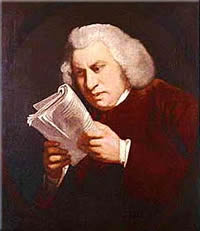 Dr. Johnson at study.
Dr. Johnson at study.“Consciousness is the phenomenon whereby the universe’s very existence is made known.” Roger Penrose, The Emperor’s New Mind, 1989 (1).
I had this peculiar sensation a few mornings ago. I woke up and first thing it was like light bursting into me from the outside, while, at the same time, my consciousness was bursting out into the world from the inside. I felt strangely connected to the moment and, through that, to the whole universe.
It only lasted for a second. After that I wanted to go back to sleep again.
That’s the trouble with consciousness: it’s a purely temporary phenomenon, not to say, exceptionally tiring.
The question is: where does consciousness come from? Does it come from the brain, as some modern scientists would have us believe? In some cases they even go so far as to say that they can locate the exact place - the exact set of cells in the exact part of the brain - where consciousness supposedly resides. (Turn right at the frontal lobe, left at the pituitary gland, and it’s first on your left.)
This is patently false. Take away my brain and you may well take away my consciousness (at least for the moment) but you don’t take away ALL consciousness.
The guy who has just removed my brain remains conscious, for example. He’s standing there looking down at this pulsing splodge of blood-smeared grey porridge in his hands, wondering what on Earth he did that for?
So, while a particular brand of reductionist science would like us to believe that the brain is a consciousness-generator, it could be also argued that it is just as much a consciousness-receiver.
Maybe it’s a two-way transmitter/receiver like a sophisticated version of one of those walkie-talkies the army uses. The question then has to be: where are the Headquarters?
We would have to be a very vain species indeed to assert that we are the only forms of consciousness in the universe. Vain, isolated and stupid. Which, it has to be admitted, is a fairly good description of most of the human race for most of the time.
My answer to this is to say that consciousness could be like gravity or light or time or matter. That is, it is one of the properties of the universe that came into being when the universe was born.
In the beginning was consciousness.
Which brings up another question: namely, where does consciousness go when we are asleep? It still exists, it’s just that we are no longer conscious of it. The brain is still generating images, and our dreaming selves are still ourselves even though we are no longer awake.
Modern psychology refers to this as the Unconscious, which is like defining something by something it is not. It is not conscious. It‘s a bit like answering the question, “what kind of tree is that?” by saying, “it is not a carrot.”
Later Mr Freud came up with another term. He called it the Id, which means “it” in German. In other words, his answer to the question, “what is the unconscious” is to say, “it is it,” which is almost as meaningless.
Which leaves us with a final question: does the world exist, as such, without a mind to perceive it?
That was the gist of Bishop Berkeley’s (2) famous question about the branch falling off a tree in a forest when no one is watching. How can we know it ever happened?
In order to disagree with Bishop Berkeley’s theory about the non-existence of matter, Dr. Johnson (3) kicked a stone and said, “I refute it thus!”
Roger Penrose’s theory (as quoted above) seems to suggest something different. The universe only exists, he implies, in order to be perceived by us.
Which is a bit like saying that that stone that Dr. Johnson kicked only existed in order to refute Bishop Berkeley.
It’s a pity we can’t ask the stone.
*******
(1) http://www.friesian.com/penrose.htm
(2) http://www.iep.utm.edu/b/berkeley.htm
(3) http://andromeda.rutgers.edu/~jlynch/Johnson/



No comments:
Post a Comment